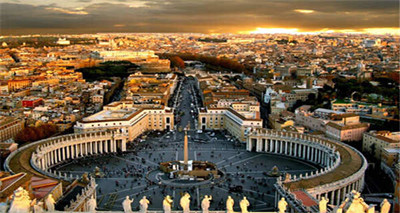梵蒂岡和土耳其
Never forget
永世銘記
Forthrightness about a past atrocity provokes a strong reaction
直面暴行,一石激起千層浪
IN 1915 Pope Benedict XV wrote to Mehmed V, the Sultan of the Ottoman Empire, saying that he could hear “the echo of the groans of an entire people…subjected to unspeakable sufferings”. When the two leaders'modern-day counterparts met last November at the Turkish presidential palace outside Ankara, those echoes were still audible. According to a new book by Franca Giansoldati, the Vatican-watcher of Il Messaggero, an Italian daily, Recep Tayyip Erdogan, Turkey's president, “begged” Pope Francis to refrain from openly characterising the Ottoman Empire's slaughter of Armenians in 1915 as genocide.
1915年教皇本篤十五世致函奧斯曼帝國蘇丹—默罕默德五世,言及他能聽到“整個民族遭受難以言狀痛苦時所發出的呻吟在天際回響。” (一百年后的)今天,當年兩大巨頭各自的繼任者去年11月在土耳其安卡拉外的總統官邸會見時,這種回響仍然久久不散。意大利報紙《信使報》梵蒂岡問題觀察家Franca Giansoldati在一本新書中披露:土耳其總統雷杰普塔伊普埃爾多安“懇祈”教皇弗蘭西斯不要把1915年奧斯曼帝國屠殺亞美尼亞人的事件公開定性為種族滅絕。

The pope respected his host's wishes then. But on April 12th he abandoned tact and referred to the killings as “the first genocide of the 20th century”. The Turkish government responded with outrage and recalled its ambassador to the Holy See for consultations. A vote in the European Parliament on April 15th, commending the pope's statement and urging Turkey to recognise the massacres as genocide, further infuriated Mr Erdogan. “It is not possible for Turkey to accept such a crime, such a sin,” he said.
雖然一開始尊重了總統的訴求,但到了4月12日,教皇卻撕破臉并將此次屠殺斥之為 “20世紀首屈一指的種族滅絕事件。”土耳其政府大吃一驚,召回了駐梵蒂岡教廷的使節進行磋商。4月15日歐洲議會投票表決支持教皇的聲明,并敦促土耳其承認此次屠殺是種族滅絕行為,這更進一步激怒了埃爾多安總統。他說:“土耳其絕不承認這種罪行。”
Francis has used the same phrase before, most recently in 2013 when he met an Armenian delegation. But that was scarcely reported, and the Turkish authorities merely expressed “disappointment” and called in the Vatican's envoy for a ticking-off. This time, he was making a much-awaited speech in front of Armenia's president, Serzh Sargsyan, days before the official centenary commemorations on April 24th.
教皇方濟各此前也用過相同的措辭,最近一次是在 2013 年接見亞美尼亞代表團時。但這些言論幾乎鮮有報道,土耳其政府也僅僅是表示了“失望”,并召會梵蒂岡特使進申斥而已。然而這一次,就在4月24日的正式百年紀念活動開始的前幾天,他當著亞美尼亞總統薩爾基相的面發表了這樣一個“眾望所歸”言論。
Turkish diplomats are understood to have set themselves two aims as the centenary approached: to stop the mass at which Francis spoke being held on the day itself, and to prevent him from using the G-word. They gained their first objective. In deciding to deny them their second, the pope and his diplomatic advisers had to weigh opposing factors.
百年慶典臨近時,土耳其的外交官們心照不宣地為自己設定兩個目標:其一是阻止紀念日當天方濟各要作演講的那個群眾集會。其二是阻止他用“種族滅絕”的字眼。第一個目標落空了。而要頂住土耳其的第二個訴求,教皇和他的外交顧問不得不權衡對手的實力。
The Vatican has long been the venue of a tug-of-war between proponents of careful dialogue with the Islamic world and advocates of bluntness, who feel that tact has got Christians nowhere and that plain speaking is needed, even if it causes offence. The plain-speakers had the upper hand under the previous pope, Benedict XVI. Francis's latest comment suggests they are back in the ascendancy.
長期以來,梵蒂岡處在一個兩難境地:一派主張和伊斯蘭世界對話務求謹慎,而另一派則主張直言不諱。后者認為圓滑世故將使得基督徒一事無成,因此即使會招災惹禍,也須仗義執言。如今,在教皇本篤十六世的領導下,主張直言不諱的人占了上風,方濟各最近的言論正表明了這種壓倒性優勢。翻譯:沈竹 校對:戴秀平












